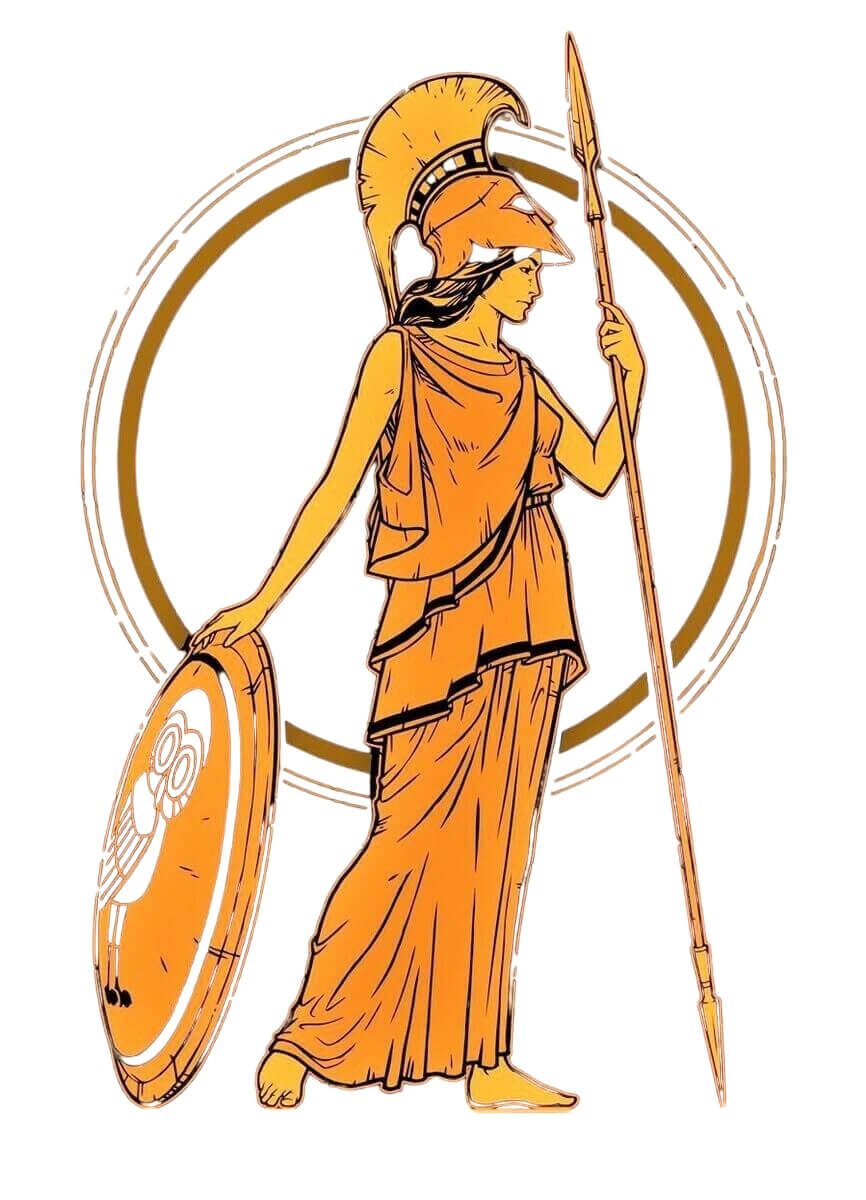Aphrodite: Greek Goddess of love and beauty
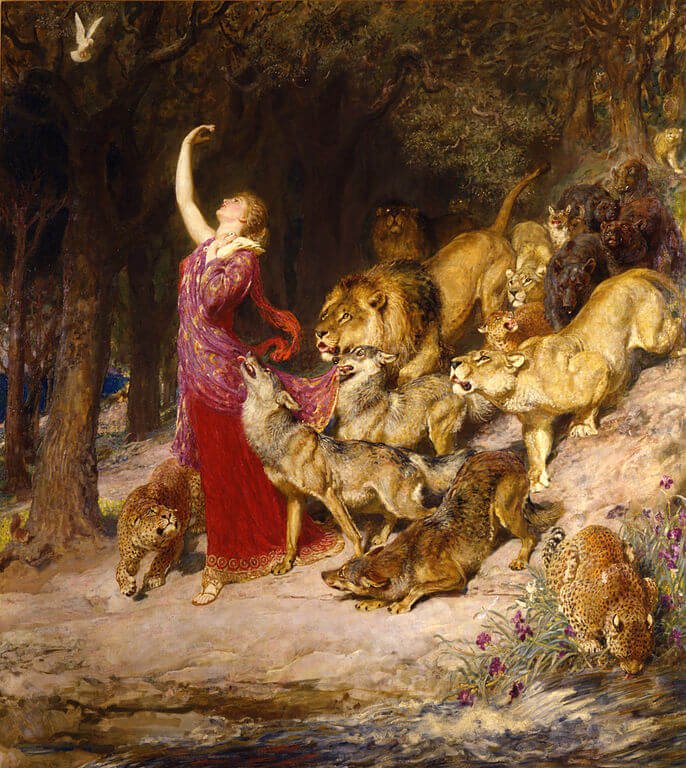
In Greek Mythology, Aphrodite was the goddess of love, beauty, carnal desires and erotic passions. As the patroness of sexuality and lust, she used to torment mortals and gods, without distinction. In ancient Greece she was also venerated, as the benefactress of marriage and procreation.
The birth of Aphrodite
Aphrodite, the Greek goddess of love, was born from the snow-white sea foam near the island of Cythera. It was produced by Uranus’s genitals, when his son Cronus had lacerated and launched them into the sea. According to the myths Aphrodite reached the shore on a beautiful shell. The young Horae, deities of seasons, surrounded the beautiful goddess. They dressed her in golden woven clothes and crowned her head with a wreath of flowers. Wherever the goddess of love stepped, everything blossomed and the air was filled with fragrance.
Aphrodite and love affairs
Tall, slender, and golden-haired, Aphrodite shines with an incredible beauty among the gods of Olympus. As the goddess of love and sexual desire, Aphrodite reigns over the carnal emotions of humanity. Therefore, no one can escape the power of her amorous frenzy and even the gods submit to her wishes. Only Athena, Hestia and Artemis withstand the tremendous inducement of her magic.
Aphrodite awakens love in the hearts of gods and mere mortals. Thus, even animals and birds surrender to her force of love. When she walks on earth, pairs of animals follow her steps. In this procession, the deer safely walks next to the bloodthirsty wolf, and fierce lions fall at the feet of the goddess.
Aphrodite concedes beauty and youth to maidens, and blesses happy marital unions as well. In gratitude for their marriage and before the wedding, young women used to offer fine woven belts to Aphrodite as a sign of their thankfulness and appreciation. But not only young ladies prayed to the goddess. Widowed women also honored her romantic qualities and demanded her to be allowed to remarry.
Gracious and merciful, the goddess of love often condescends to the requests of mortals. After all, although the marriage is engaged by Hymen, it is Aphrodite, who excites people until their romantic madness. Thereafter it leads the mortals onto their sudden union and wedding.
In a golden jewel-encrusted chariot drawn by doves, the goddess of amorous passions rushes to earth from Olympus. Many people like her tremendously and search her help in their love affairs.
Pygmalion and Galatea
Aphrodite gives happiness to those who faithfully venerate her. In fact, she helped Pygmalion, the king of the island of Cyprus. He was also a sculptor and the art was his only love. Therefore, he avoided women and lived very secluded. Many Cypriot maidens had a tender and devoted love for their king, but he never payed attention to none of them. Thus, one day the young ladies prayed to Aphrodite and demanded Pygmalion to be punished, because of his celibate attitude.
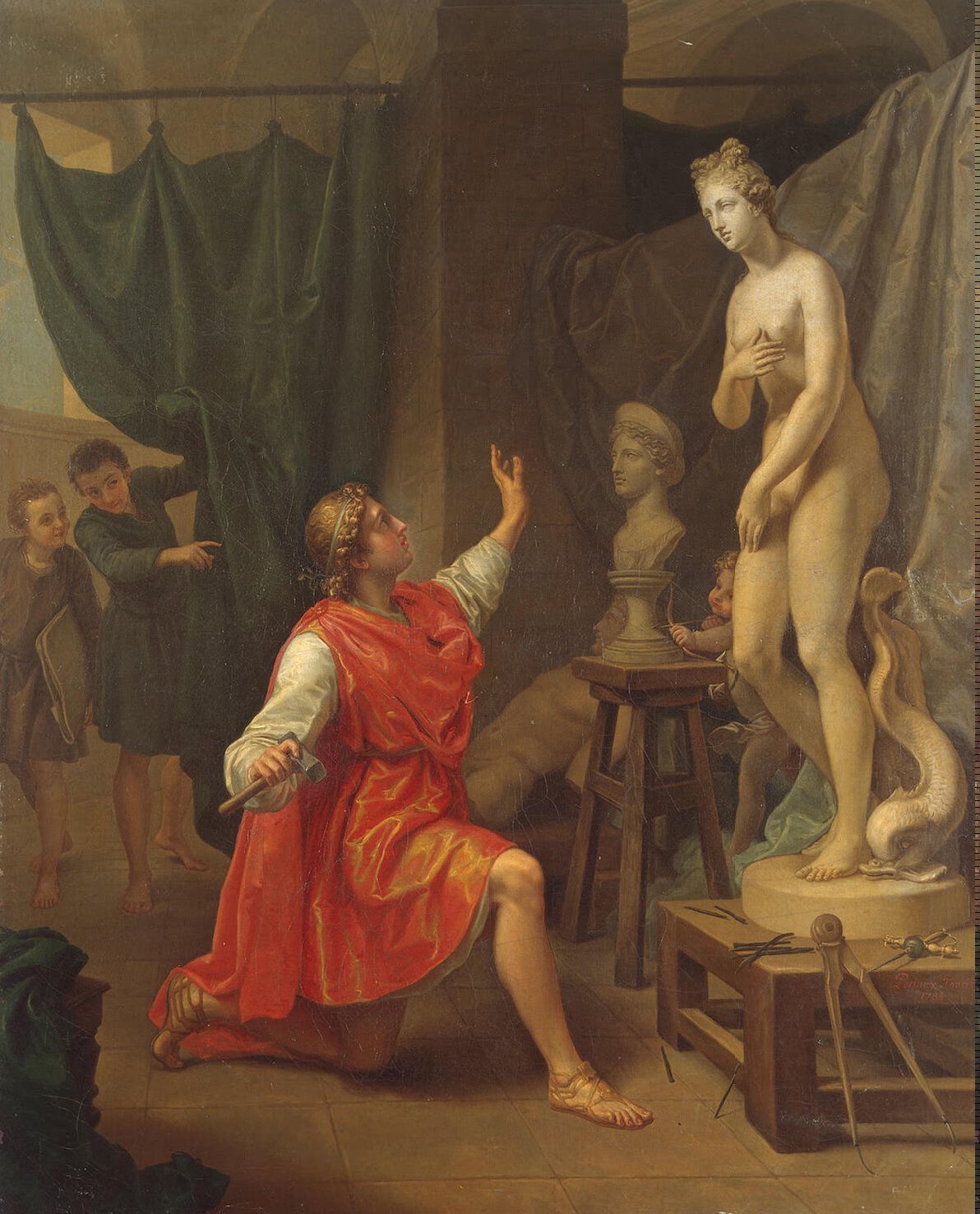
“Oh, golden Cyprida! Punish this proud man! Let him experience the torment that we have to endure because of him!”
Thereafter Pygmalion sculpted a statue of pretty young maiden out of an awesome shiny ivory. The sculpture looked ravishing and gorgeous. It seemed that the luscious girl was about to breath, move from her seat and speak. For hours, the master stared obsessively at his creation and fell in love with it. He put flawless jewelry on her neck, dressed her in luxurious clothes, whispering as a crazy about his desire to awaken the carving.
“Oh, if you were alive – how happy I would be!”
Aphrodite animates Galatea
The days of Aphrodite’s festivity had arrived. Pygmalion made rich sacrifices to the goddess and begged her for an alluring woman. The sacrificial flame flared brightly. Thus the goddess of love accepted Pygmalion’s offering.
The enamored king returned home, approached his creation and suddenly noticed that the ivory turned pink. It looked as if scarlet blood flowed through the veins of the sculpture. Pygmalion touched his masterpiece’s hand – her body became warm and tender. Her heart was beating and the eyes glowing with bliss. The statue came to life!
Pygmalion called her Galatea and for the first time in his life began to feel the power of happiness. Aphrodite made the couple be happy and infatuated with each over. All their lives they glorified her powerful greatness, because she gave them elation and jovial felicity.
Myrrha, Adonis and Aphrodite
Aphrodite gave exhilaration and happiness to those who love and crave for love. However, as the goddess of amorous frenzy and nuptial bliss she also knew what is the unhappy love.
Once upon a time, Myrrha (the daughter of the king Cinyras of Cyprus) rejected offerings to Aphrodite. The angry goddess punished her severely by instilling criminal love for her own father. Thereafter Myrra deceived her father and he succumbed to temptation. Although when he learned that it was his own daughter, who laid with him in the darkness he tried to kill her. But she escaped. The gods took pity on Mirrha when she begged them for help and afterwards turned her into a myrrh tree.
The handsome little Adonis was born from the cracked trunk of this tree. Aphrodite put him in a casket and gave him to Persephone to be raised to manhood. Time passed and the child grew up, but the goddess of the underworld, charmed by his beauty, did not want to give him back to Aphrodite.
Therefore, the goddesses had to turn to Zeus in search for the solution to their dispute. After having listened the both sides, the supreme god decided that Adonis should spend one third of the year with Persephone, and another third with Aphrodite, living the remained part of the year with whomever he would prefer as a friend. Therefore, Adonis chose Aphrodite and became her companion and lover.
However, their happiness did not last long, insomuch as Adonis received a mortal wound from a huge wild boar. From his blood grew splendid anemones, meanwhile Aphrodite cried over his breathless body and her tears fell upon the ground.
The worship of Aphrodite
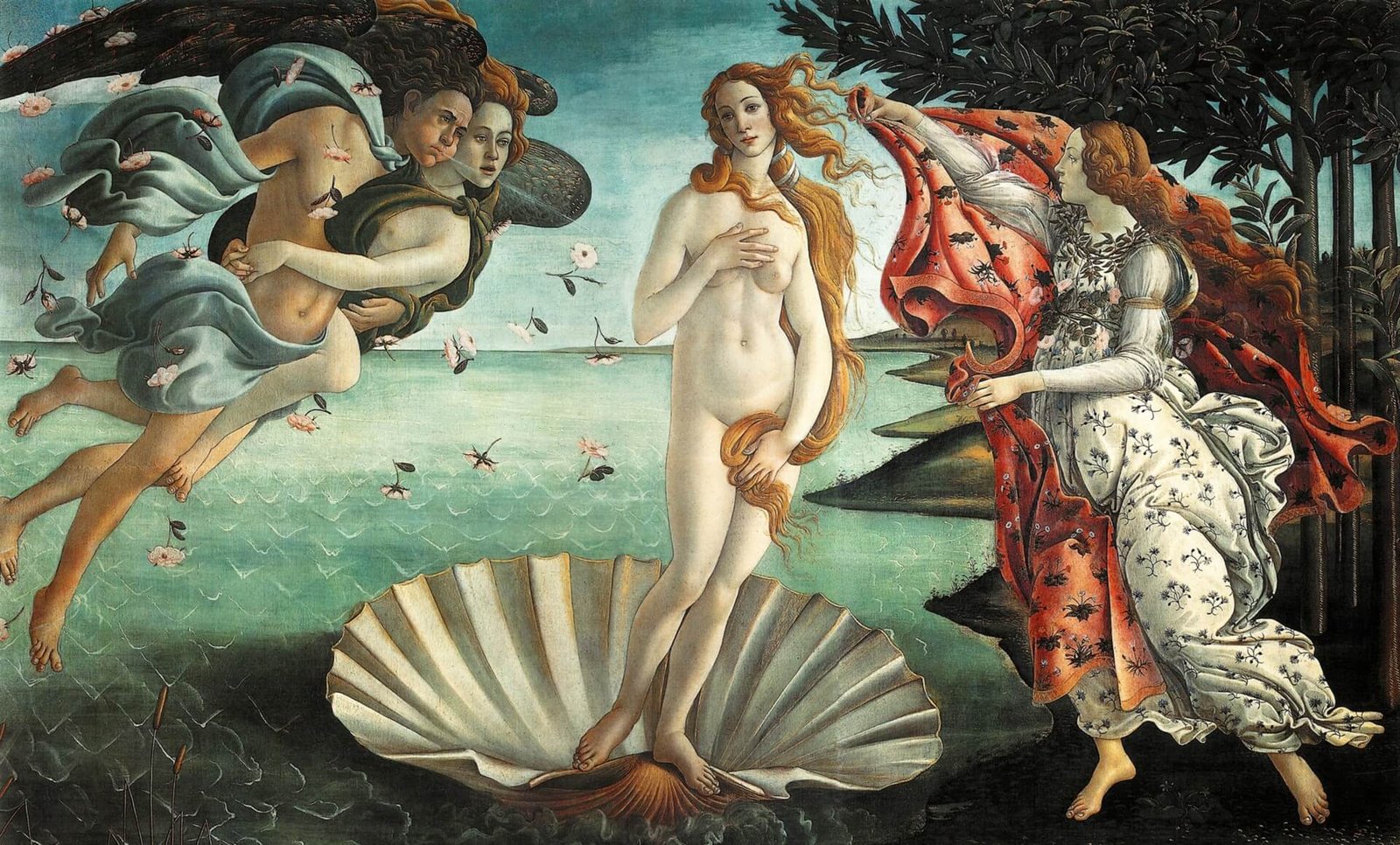
Sailors made sacrifices to Aphrodite Euploia (“Smooth sailing”), hoping that she would protect them during sea journeys and trips. Otherwise they also venerated Aphrodite Limenia (“of the harbour”), the patroness of harbors and ships, which stood in them.
The Greeks dedicated many animals and plants to Aphrodite. As the goddess of love and fertility, she was associated with gooses, swans, doves, sparrows and hares. That is, those creatures that, according to the ancient Greeks, embodied fertility. As a sea goddess Aphrodite had frequently appeared with the dolphins swimming by her side, because of her maritime origins.
Thereupon the Greeks dedicated several flowers, vegetables and fruits to Aphrodite. Roses, anemones, lettuces, pomegranates and apples, which had personified and expressed mutual love and affection.
Melanion and Atalanta
Atalanta was the ravishing young daughter of Boeotian king. An oracle foretold her a bad misfortune, in case of a marriage and scared her to death. Thereupon she had been rejecting her suitors by competing and winning a footrace against them.
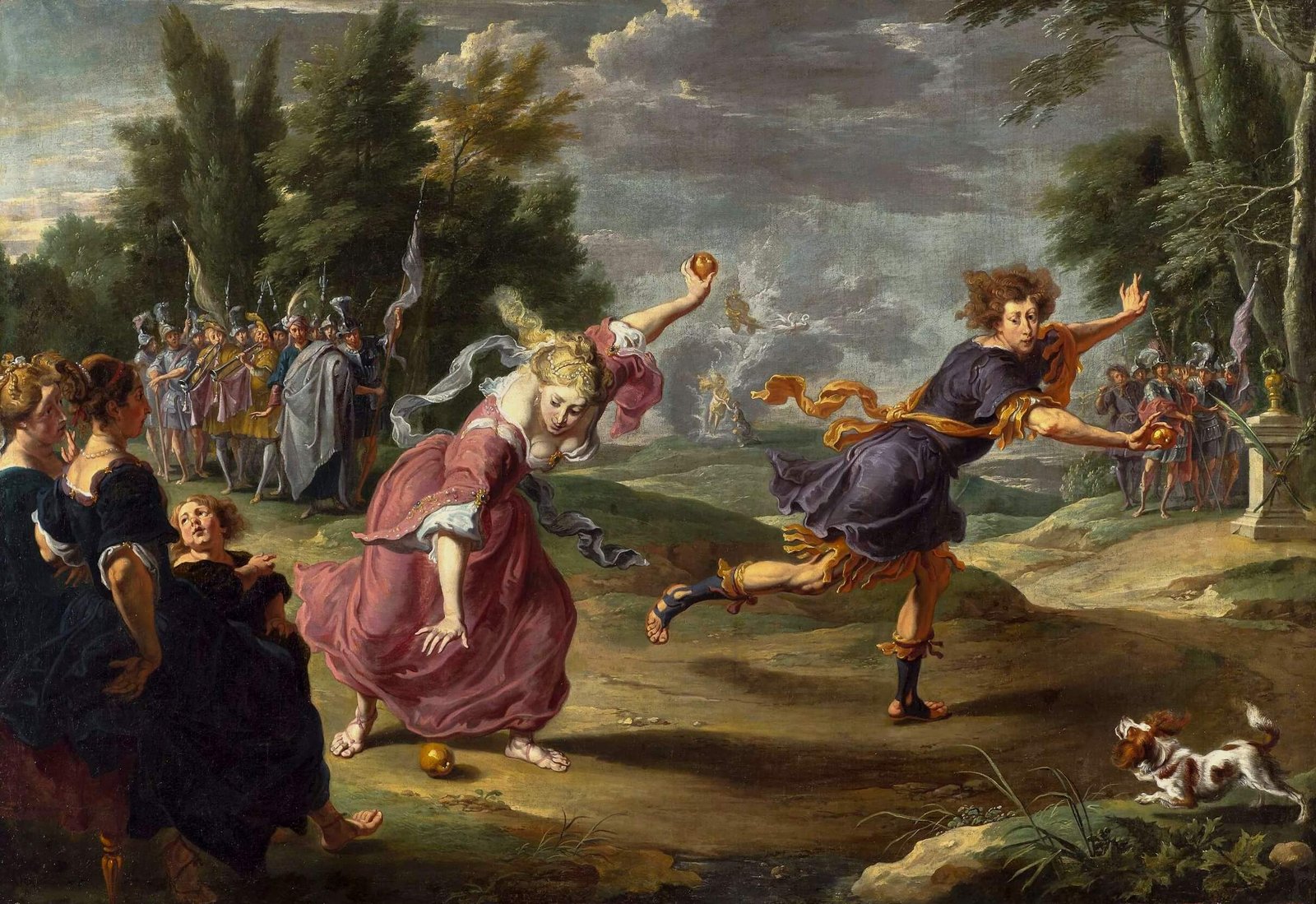
At her own request and as a preventing menace against wooers, the guards warned the suitors about the death sentence. Melanion was one of them. He became besotted with Atalanta, and implored Aphrodite for help. Therefore, the goddess gave him three golden apples to be thrown on the way to distract Atalanta.
In fact, he managed to deflect the young princess and won the contest. Because he dropped the three apples at the same time and Atalanta stopped to pick them up.
However, the story didn’t end well. Insofar as the both lovers had been finally turned into lions by Cybele, during their journey to Melanion’s homeland. The Anatolian mother goddess, angered at them because of having profaned her sanctuary with their amorous lust and passion.
Judgement of Paris
Once upon a time the Olympians celebrated a joyful, opulent feast in honor to recently married Peleus and Thetis. In the middle of buoyancy and rapture they forgot about Eris, the goddess of discord and did not invite her to the celebration. She had an irritating nature and the gods would not like her attendance. For that reason, Eris became anguished and plotted a bad revenge. She had thrown a golden apple into the ceremony with a disquieting inscription of “for the most beautiful.” It had provoked a noisy quarrel between the attendant goddesses and each one of them wanted the apple.
Aphrodite, Hera and Athena claimed the fruit as a worthy prize for their ravishing beauty and had to take their discussion forward to Paris. The prince of Troy, referred by Zeus as an appropriate judge of female attractiveness.
Hermes escorted the three goddesses to the prince and they approached Paris, while he herded the cattle. After having examined the wondrous allure of the goddesses, Paris was not able to choose between them. Since they looked perfectly bewitching and attractive. For that reason, each of the goddesses offered him a bribe if he chose one of them.
Hera promised the prince to become the king of Europe and Asia Minor. Athena had told, he would be awarded with wisdom and the greatest military skills. And finally Aphrodite offered Paris the love of the most beautiful woman, Helen of Sparta, who was already the wife of king Menelaus. Paris didn’t think it through and chose Aphrodite as the most beautiful goddess. It was a pernicious and unwise decision, since it had supposed the beginning of the Trojan War, the destruction of his homeland and his own death.
